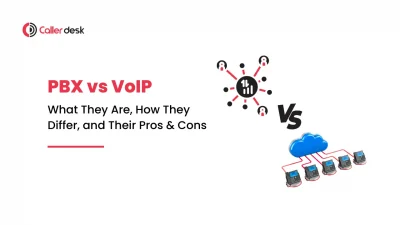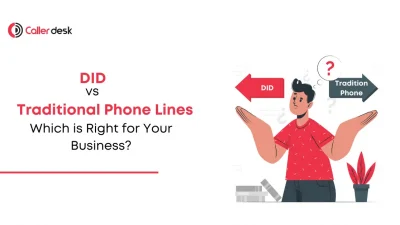Thinking about switching to Voice over Internet Protocol (VoIP)?
You’re not alone! Many businesses and individuals are moving to VoIP phone systems to save money and improve communication. But before you decide, it’s important to understand the pros and cons of VoIP.
While VoIP offers cost savings, flexibility, and advanced features, it also has some disadvantages, such as dependence on the internet and security risks. In this blog, we’ll break down what VoIP is, how it works, and the 5 major disadvantages and advantages of VoIP so you can decide if it’s the right choice for you.
What is VoIP?
VoIP (Voice over Internet Protocol) is a technology that allows you to make voice and video calls over the internet instead of traditional phone lines.
Here’s how it works:
- Your voice is converted into digital data.
- That data is sent over the internet instead of phone cables.
- The person on the other end hears your voice just like a normal call.
Many businesses prefer VoIP phone systems because they are affordable, flexible, and come with extra features like call forwarding and voicemail-to-email. However, before you switch, it’s essential to know both the advantages and disadvantages of using VoIP.
Pros & Cons of VoIP
Like any technology, VoIP has its own advantages and disadvantages.
5 Advantages of VoIP
1. Lower Communication Costs
Traditional phone lines can be expensive, especially for international calls. VoIP helps businesses save money by:
- Lowering call rates for both local and long-distance calls
- Eliminating the need for physical phone lines
- Offering pay-as-you-go or subscription-based pricing for better budget control
If high phone bills are a concern, switching to VoIP can cut costs by up to 50%.
2. Flexibility & Remote Work Support
VoIP is not tied to a physical location, allowing users to make and receive calls from:
- Smartphones
- Laptops and tablets
- VoIP-enabled desk phones
For businesses with remote teams or employees in different locations, VoIP ensures seamless communication.
3. Easy to Scale for Growing Businesses
Adding new users to a VoIP system is quick and cost-effective. There is no need for additional hardware or expensive infrastructure upgrades.
- Simple setup for new employees
- Pay only for what you use
- Scalable solutions for businesses of all sizes
This makes VoIP a great choice for businesses planning to expand.
4. Advanced Features for Better Communication
VoIP offers features that traditional phone systems lack, such as:
- Call recording for reference and compliance
- Voicemail-to-email for easier access to messages
- Auto-attendants to direct callers to the right department
- Video conferencing for virtual meetings
These features improve both internal and customer communication.
5. Easy to Scale for Growing Businesses
Adding new users to a VoIP system is quick and cost-effective. There is no need for additional hardware or expensive infrastructure upgrades.
- Simple setup for new employees
- Pay only for what you use
- Scalable solutions for businesses of all sizes
This makes VoIP a great choice for businesses planning to expand.
Top 5 Disadvantages of VoIP and How to Overcome Them
1. Internet Dependency
VoIP relies entirely on an internet connection. A weak or unstable connection can result in:
- Dropped calls
- Audio delays
- Poor call quality
For this Businesses should use a high-speed fiber connection and have a backup internet option to ensure smooth VoIP performance.
2. Emergency Call Limitations
Unlike traditional landline phones, VoIP doesn’t always provide accurate location details when you dial emergency services. This means that if you call for help, responders might not know exactly where you are, which could delay assistance.
Solution: Choose a VoIP provider that supports Enhanced 911 (E911). This feature helps share your location with emergency services. Also, businesses should inform employees about this limitation and keep an alternative way to call for help, such as a mobile phone or landline.
3. No Service During Power Outages
Landline phones keep working during power cuts, but VoIP stops working if there’s no electricity or internet. That means if your Wi-Fi or power goes down, so does your VoIP service.
Solution: To stay connected during outages:
- Have a mobile phone or landline as a backup in case of emergencies.
- Use a battery backup (UPS) or a generator to keep your VoIP system running.
4. Security Concerns
Since VoIP uses the internet, it can be hacked or attacked by cybercriminals if not properly protected. This can lead to:
- Spam or fraudulent calls disrupting your business.
- Hackers listening to calls without permission.
- Data theft, including sensitive business information.
Solution: To keep your VoIP system secure:
- Use strong, unique passwords and change them regularly.
- Enable call encryption to protect conversations.
- Set up firewalls and secure networks to block attacks.
- Keep VoIP software updated to fix security flaws.
5. Initial Setup and Training
Unlike traditional phones that work right away, VoIP needs proper setup and some learning. Businesses may face:
- Technical setup issues while installing the system.
- Training needs for employees who are new to VoIP.
- Internet adjustments to ensure smooth calls.
Solution: Choose a VoIP provider that offers easy setup and good customer support. Also, train employees so they can use VoIP confidently without confusion.
Is VoIP Right for You?
VoIP can save money, offer advanced features, and make business communication more flexible. But before you switch, let’s see if it’s truly the right fit for your needs.
Ask yourself these key questions:
1. Is your internet fast and stable?
VoIP relies on a strong internet connection. If your network is slow or unreliable, you might experience dropped calls and poor audio quality. If that’s the case, upgrading your internet should be your first step.
2. Are you looking to cut costs?
Traditional phone systems can be expensive, especially for long-distance and international calls. VoIP reduces costs by up to 50%, making it a smart choice for businesses trying to save on communication expenses.
3. Does your business need remote access?
If your team works remotely or you travel frequently, VoIP allows you to stay connected from anywhere.
4. Do you need advanced features?
If your business requires call recording, video conferencing, voicemail-to-email, or CRM integration, VoIP gives you all these features without extra costs. It’s much more than just a phone system—it’s a complete communication tool.
5. Is your business growing?
VoIP makes it easy to add new users, open new locations, and scale your operations without the hassle of installing new phone lines or hardware. If expansion is in your plans, VoIP is a future-proof choice.
6. Is Your Current Phone System Working?
Compare your existing phone setup with VoIP:
- Is your current system expensive or hard to maintain?
- Are you missing helpful features like video calls, call forwarding, or voicemail-to-email?
If your current system feels outdated, VoIP can be a good upgrade.
7. Do you have a backup plan for emergencies?
If your business relies on 24/7 communication, make sure your VoIP setup includes backup options for emergencies, like a power outage or internet downtime.
Conclusion
VoIP is a smart and affordable way to improve communication for both businesses and individuals. It helps cut costs, offers more flexibility, and comes with useful features like call forwarding and video conferencing.
However, VoIP also has some challenges—it depends on a strong internet connection and requires good security measures to keep your calls and data safe.
By knowing the pros and cons of VoIP, you can decide whether it’s the right choice for you. If you have a reliable internet connection and need an easy-to-use, cost-saving phone system, VoIP can be a great solution.
Looking for a VoIP system that fits your business needs? CallerDesk makes it easy to set up and manage, ensuring smooth communication and top performance.





